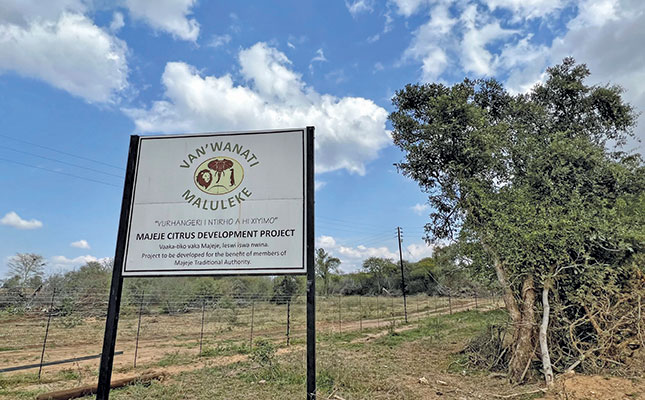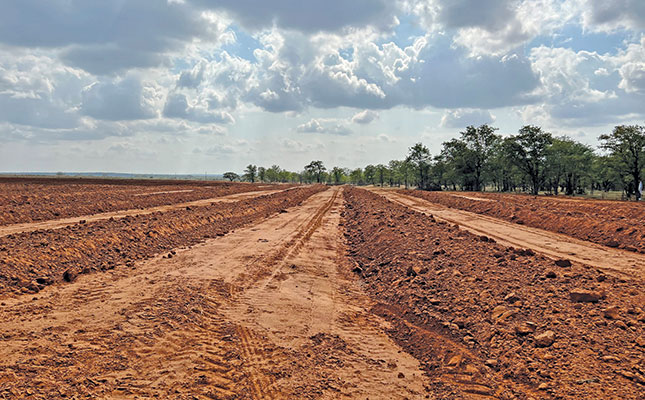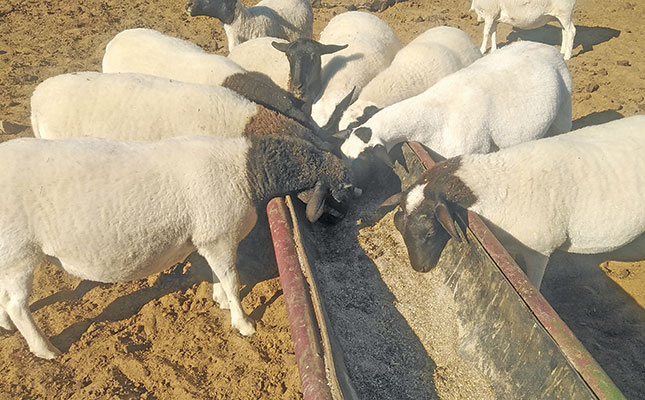
Photo: Majeje Trust
In an effort to bolster the agriculture sector’s transformation efforts, the Motsepe Foundation and Agri SA, through its subsidiary Agri Enterprises, launched two pioneering agricultural development projects earlier this year, one in Mpumalanga and the other in Limpopo.
As part of their objectives, these projects are aimed at rethinking development funding in order to accelerate inclusion in the sector.
Over the years, a number of promising agricultural projects around the country have been unable to secure adequate funding due to their lack of land tenure or ownership.
READ How a Mexican beer and limes helped uplift a community in SA
“Most of the land in the former homelands and communal property associations is owned by the state, and this cannot be collateralised,” says Omri van Zyl, CEO of Agri Enterprises. In addition, many communities don’t have the necessary skills to develop commercial farming enterprises.
“The inability of these farmers to write proper business plans further exacerbates the problem. Banks and other financiers are reluctant to get involved in projects if the business plans are inadequate,” he adds.
Private-sector support
Agri Enterprises and the Motsepe Foundation have stepped in to fill this gap, demonstrating the private sector’s will and ability to help transform the agriculture sector in South Africa.
The Mpumalanga project is focused on the three joint ventures that were established following the success of the Greater Tenbosch Land Claim in 2005. The land was intended for sugar cane cultivation; however, the ventures were unable to secure funding until now.
RCL Foods has been a crucial partner in this project, as it now provides the only funding for the ventures.
READ ‘Free’ the private sector – and watch SA thrive!
Majeje Citrus company, located in Phalaborwa, was established in 2020. It was selected for the Limpopo project, which is a partnership between the Majeje Tribal Authority, the Komati Fruit Group and Boela Bruwer, an agricultural economist and business adviser.
In light of the commercial nature of the two projects, the Motsepe Foundation facilitated approximately R70 million in funding through a company established by the Motsepe family.
Funding will be in the form of soft loans repayable over five to 15 years at an interest rate of 4,5%. Majeje Citrus will receive a loan of about R30 million. In order for the company to be eligible for participation in the project, the Motsepe Foundation set out certain conditions.
The first of these was that the relevant local traditional authority needed to have a strong presence in the project. Secondly, well-known successful business partners needed to be involved in the ownership model to ensure the project’s success. Thirdly, the project had to be financially viable. Majeje Citrus ticked all three boxes.
“In 2020, the Majeje Tribal Authority contacted Komati Fruit Group with a view to becoming partners in this development programme.
The leader of the authority, Mlungisi Ntsanwisi, had a specific strategic vision of how he wanted to manage the communal land, with part of the area earmarked for a commercial citrus farming enterprise, and Komati delivering developmental and managerial services,” explains Piet Smit, CEO of the Komati Fruit Group.
The Majeje Community
The Majeje Tribal Authority is the de facto owner of the Majeje community’s land, which comprises 29 farms covering 66 569ha. The land is utilised for residential purposes, cattle farming, crop production under irrigation, and nature conservation.
The farms are administered and controlled by the Majeje tribe’s traditional leadership in terms of well-established principles of customary law. Under this law, the traditional leader, in conjunction with the traditional council, plays an active role in the allocation of land and land rights, as well as any development of the land.

Some 50 000 people are part of the Majeje community, which is made up of four villages.
Ntsanwisi is the current hosi or chief of the Majeje tribe, having taking over the role from his father, the late Prof Hudson Ntsanwisi, in 1994.
Along with his 23 councillors, Ntsanwisi has a vision to develop the Majeje community’s agricultural land in order to create sustainable jobs for the Majeje people.
Their strategy is threefold: to give Majeje’s emerging farmers access to land, to lease land to successful commercial farmers, and to develop large-scale agribusinesses for the Majeje people.
The community has registered water-use rights for a total of 1 200ha, and since the adoption of the strategy, more than 400ha under irrigation have been developed, thereby contributing significantly to the improvement of the people’s standard of living.
Majeje Citrus
The Majeje Citrus Development Project, which had its origin in Ntsanwisi’s vision for the community, will focus on citrus farming to the benefit of the people.
“Job availability in the area is limited. We’ll be planting citrus on 457ha of irrigated land, and through this project aim to create about 90 new permanent and up to 400 seasonal jobs,” says Ntsanwisi.
He adds that the land was underdeveloped because of a lack of capital, technical resources, and the appropriate skills and expertise. Bruwer says that he hopes the project will address the lack of employment opportunities in the community, and assist in skills transfer.
“Through this, I hope that the project will become something of which the entire community can be proud.
“It’s important to note that, even through seasonal work alone, people will be employed for eight to nine months of the year during the citrus season. In addition, if one takes into consideration the fact that each person employed has about five dependants, the project’s impact will be considerable, especially since the Majeje community has preferential rights to all new job opportunities created by the project.”
Additional funding
Thanks to the loan provided by the Motsepe Foundation, the Majeje Citrus project unlocked a further R90 million in funding from Absa and the Limpopo Department of Agriculture and Rural Development. The project was launched in 2021, and is set to be fully developed by 2027.
According to the agreement between the three parties involved in the project, the Komati Fruit Group will manage the development, production and marketing of the citrus.
“Some of the advantages of Komati’s involvement is that the project will benefit from our ability to negotiate more favourable input prices and our knowledge of the markets,” says Smit.
READ R141 million investment boost for smallholder citrus farmers
Bruwer adds: “We’re already experiencing a difference in the general attitude among community members due to the financial injection into the area.”
Over a period of five years, 457ha will be planted to citrus, about 100ha to lemons, and the rest divided equally between grapefruit and Valencia-type oranges.
At the time of going to print, 20ha of lemon trees had already been planted and a further 200ha cleared and prepared for more planting.
While the project has water-use rights from the Groot Letaba River Water Development Project to irrigate the citrus, water is being pumped from a borehole for the time being.
Within the next couple of months, it will be pumped from the Letaba River into four holding dams and a couple of gravity dams on the land.
Drip irrigation lines are installed prior to the planting of the trees. The first harvest is expected in 2025, and will thereafter increase exponentially as a result of more trees coming into yield.
Expansion across the country
The partners in the project are hopeful that it will promote further growth in the area, especially with regard to infrastructure development and, more specifically, the upgrading of the access roads to the area.
“Komati has been amazing in its approach to rural development and sets the tone on this front. The number of jobs created and livelihoods impacted through this project is a great story on its own,” says Van Zyl.
According to him, the partners are looking at several other developmental opportunities and want to target other provinces, too.
Van Zyl feels that the most important advantage of being a participant in this initiative is the fact that it is accompanied by affordable funding. “This de-risks the project to an extent, and makes other investment opportunities possible for farmers,” he says.
According to Dr Patrice Motsepe, founder of the Motsepe Foundation, the establishment of mutually beneficial partnerships between traditional and other historically disadvantaged communities, as well as emerging and established producers, will remain crucial for the long-term sustainability and growth of these communities, black farmers, and the country’s agriculture sector in general.
“It is imperative that traditional communities, poor rural and urban communities, black farmers and other historically disadvantaged communities participate in and benefit from the agricultural industry in South Africa. We have a lot of urgent work and measures to implement to make this happen.
“We need creative and innovative funding practices that take into account the obligations that banking and [other] financial institutions have to fund those ventures that are viable and to maintain a globally competitive status,” Motsepe said at the launch of this initiative in Sandton in June.
Agri SA says it is confident that its partnership with the Motsepe Foundation will provide a vital new model for the support of forward-looking, private-sector-led initiatives aimed at promoting inclusivity in the agriculture sector.
The association adds that this innovative approach to development funding will be rolled out to other projects, and looks forward to seeing the transformation of communities as this partnership expands throughout South Africa in the coming months.
Email Omri van Zyl at [email protected], or Boela Bruwer at [email protected].










